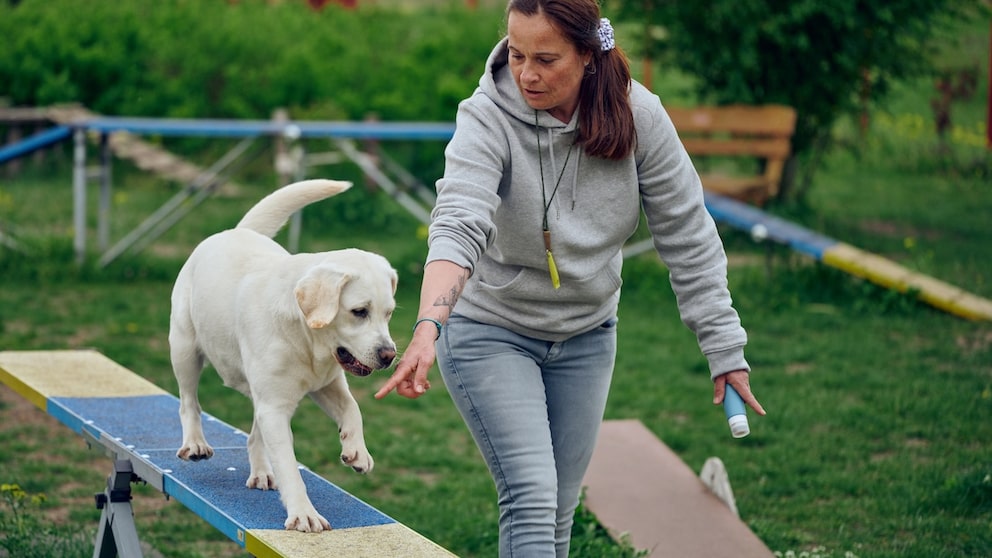March 19, 2025, 11:17 am | Read time: 4 minutes
Dog trainer Katharina Marioth sheds light on the advantages and disadvantages of innovative dog training methods such as Doggy Fitness and Minddog® and the dogs for which they are suitable.
Dogs in fitness training are becoming increasingly visible on social networks and in specialized courses. But what is behind this new trend? Doggy fitness, fitness circuits for dogs, and concepts such as Minddog® are touted as innovative solutions for better dog training. But how useful is this approach really? In this article, we take a critical look at the subject.
What Is Doggy Fitness?
Doggy fitness encompasses specialized training methods designed to enhance the physical and mental well-being of our canine companions.
Typically, the exercises include
- Physical strengthening: muscle building, coordination training, and agility. Typical aids include balance cushions, hurdles, slalom poles, and various surfaces.
- Mental exercise: auditory and visual training, agility exercises, and problem-solving tasks.
- Bonding: cooperation between dog and owner that strengthens mutual trust.
A major promise of doggy fitness is the simultaneous enhancement of a dog’s physical and mental well-being, which is believed to contribute to more balanced behavior.
What Is Behind Fitness Loops for Dogs?
Fitness circuits consist of structured programs, frequently offered as detailed training plans. They are made up of small “units” that the dog and its owner complete together. The idea comes from the human fitness sector: a cyclical program is designed to guarantee variety, effectiveness, and a targeted workout for different muscle groups.
Examples of such exercises include
- Balancing on a wobbly platform
- High jumps on low platforms
- Obstacle courses
A major advantage is the flexible design of these training sessions: they can take place both indoors and outdoors and can be tailored to individual needs.
Protected Licensing Systems Like Minddog®: What Do They Truly Provide?
Minddog® is a protected license system that markets training methods for dogs and their owners. The focus is on combining physical fitness with mental exercise.
Typical Elements of Such Programs
- Standard exercises: Balance and coordination exercises
- Mental challenges: For example, finding objects or learning new commands.
- Social training: To allow the dog to react confidently even in stressful or unfamiliar environments.
The techniques employed by Minddog® and comparable programs are patented, adhering to a standardized training concept for trainers, which includes associated fees.
Criticism: Although these concepts have professional standards, much of the content is not new. Rather, they are tried and tested techniques from physiotherapy combined with basic elements of classic dog training. The benefits depend less on the brand name and more on the trainer’s ability to personalize the training.
Is a “Gym” Really Necessary for Dogs?
Opinions differ as to whether this type of fitness training makes sense for dogs. However, there are some aspects that speak for and against it.
Pros
- Health Promotion: Dogs, particularly seniors or those with orthopedic issues, can greatly benefit from targeted exercise training.
- Exercise: Many dog breeds need far more than just a daily walk to keep them mentally and physically happy.
- Bonding: Working together strengthens the relationship between humans and animals.
Cons
- Overstraining: Not every dog is suitable for an intensive fitness program. Anxious or over-motivated animals, in particular, can quickly become frustrated, or you can create an over-stimulation problem without meaning to.
- Cost: Many fitness programs are expensive and offer no added value compared to traditional training methods.
- Alternatives: A good walk with tasks such as search games or obstacle courses often fulfills the same purpose.
Who Should Engage in Doggy Fitness, and Who Should Steer Clear?
There are several aspects that can make doggy fitness a good addition to daily bonding work. For some dogs, however, the trend is also less useful.
Suitable Participants
- Dogs with special needs: Seniors, dogs after injuries, or those who are overweight.
- Highly active breeds: Dogs such as Border Collies or Australian Shepherds that need to be heavily exercised both mentally and physically.
- Committed owners: Those who are prepared to invest time and energy in training on a regular basis.
Not Suitable for
- Puppies: Their joints and bones are still developing, so excessive training can be harmful.
- Dogs with behavioral problems: Aggressive or very anxious behavior should be worked on first through targeted behavioral training before relying on fitness approaches.
- Unmotivated owners: Training requires consistency and commitment, which not everyone is able or willing to provide.

Suitable for many breeds Canicross – how to practice this trendy sport with dogs properly

Demanding Sled Dog Not a Dog for the city! Correct Keeping of the Yakutskaya Laika

Passionate Hunting Dog Can the German Longhaired Pointer Also Be Kept as a Family Dog?
Trend or Value Add?
Doggy Fitness and programs such as Minddog® are certainly not a must-have for every dog owner. However, they can be a useful addition, especially for dogs with special needs or sporty owners who want to offer their four-legged friend more variety. At the same time, it is important to look at the dog individually: Not every animal needs a “gym” or intensive training routines to be happy and healthy.
Consequently, the question ‘Is it really necessary?’ should not be met with a blanket yes or no. The decisive factor is whether the training chosen suits the dog and its owner — and whether they both enjoy it.

